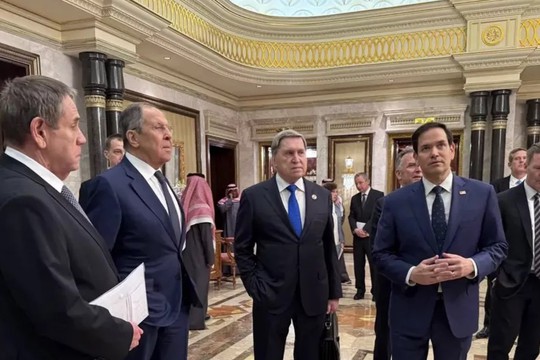Delegations of Russia and the United States during a break in negotiations in Riyadh.
Photo: Maria Zaharova
For more than a decade, the West has faced off against the East again in what was widely called a new ‘cold war’. But with President Trump back in office, America is giving the impression that it could be switching sides, notes ‘The New York Times’.
Even as American and Russian negotiators sat down together on Tuesday for the first time since Moscow’s full-fledged invasion of Ukraine nearly three years ago, Mr. Trump has signaled that he is willing to abandon America’s allies to make common cause with President Vladimir V. Putin of Russia.
As far as Mr. Trump is concerned, Russia is not responsible for the war that has devastated its neighbor. Instead, he suggests that Ukraine is to blame for Russia’s invasion of it. To listen to Mr. Trump talk with reporters on Tuesday about the conflict was to hear a version of reality that would be unrecognizable on the ground in Ukraine and certainly would never have been heard from any other American president of either party.
Mr. Trump is in the middle of executing one of the most jaw-dropping pivots in American foreign policy in generations, a 180-degree turn that will force friends and foes to recalibrate in fundamental ways. Ever since the end of World War II, a long parade of American presidents saw first the Soviet Union and then, after a brief and illusory interregnum, its successor Russia as a force to be wary of, at the very least. Mr. Trump gives every appearance of viewing it as a collaborator in future joint ventures.
He makes clear that the United States is done isolating Mr. Putin. Instead, Mr. Trump, who has always had a perplexing fondness for Mr. Putin, wants to readmit Russia to the international club and make it one of America’s top friends.
In Mr. Trump’s circle, the pivot is a necessary corrective to years of misguided policy. He and his allies see the cost of defending Europe as too high, given other needs. Coming to some kind of accommodation with Moscow, in this view, would allow the United States to bring home more troops or shift national security resources toward China, which they see as “the biggest threat,” as Secretary of State Marco Rubio put it last month.
The U.S. reversal has certainly been pronounced over the past week. Just days after Vice President JD Vance excoriated European allies, saying “the threat from within” was more worrisome than Russia, Mr. Rubio met with Russia’s foreign minister, Sergey V. Lavrov, and talked up “the incredible opportunities that exist to partner with the Russians” if they could simply dispose of the Ukraine war.
No Ukrainian leaders were in the room for the meeting, held in Riyadh, Saudi Arabia, much less other Europeans, although Mr. Rubio called several foreign ministers afterward to brief them. Instead, by all appearances, this was a meeting of two big powers dividing up areas of dominance, a modern-day Congress of Vienna or Yalta Conference.
read more in our Telegram-channel https://t.me/The_International_Affairs

 10:25 20.02.2025 •
10:25 20.02.2025 •























